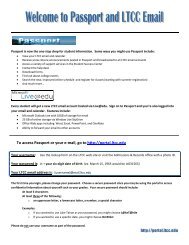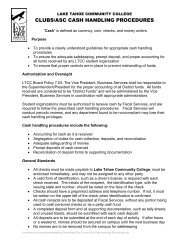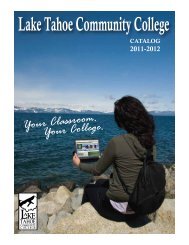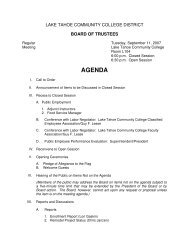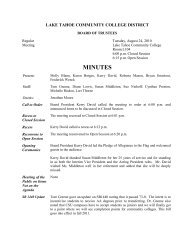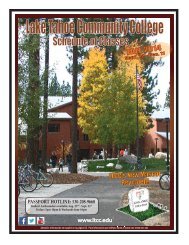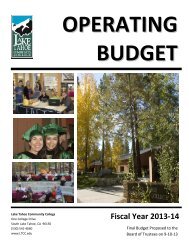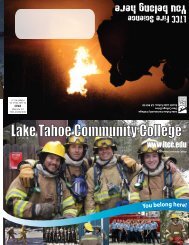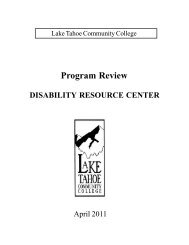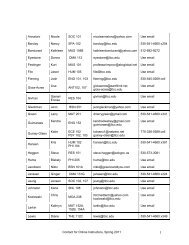View the 2010-2011 Catalog (4 MB) - Lake Tahoe Community College
View the 2010-2011 Catalog (4 MB) - Lake Tahoe Community College
View the 2010-2011 Catalog (4 MB) - Lake Tahoe Community College
- No tags were found...
You also want an ePaper? Increase the reach of your titles
YUMPU automatically turns print PDFs into web optimized ePapers that Google loves.
CRIMINAL JUSTICE130LTCC CATALOG <strong>2010</strong>-<strong>2011</strong>CRJ 102 CRIMINAL LAWLecture 4, Lab 0, Units 4This course focuses on crimes against persons, property, and soceity.It examines <strong>the</strong> historical development and philosophy of criminallaw. Topics covered include legal definitions, classifications of crimesand <strong>the</strong>ir applications to <strong>the</strong> system of administration of justice, legalresearch, review of case law, methodology and <strong>the</strong> concept of law asa social force. A review of constitutional provisions of law as <strong>the</strong>yintegrate with fundamentals of state law is provided.Transfers to CSU, UNR, UCCRJ 103 INTRODUCTION TO EVIDENCELecture 4, Lab 0, Units 4This course explores <strong>the</strong> origin, development, philosophy andconstitutional basis of evidence. Topics covered include constitutionaland procedural considerations affecting arrest, search and seizure, <strong>the</strong>right to counsel, self-incrimination, <strong>the</strong> concepts of relevance andtypes of evidence, and rules governing admissibility. This course willalso examine judicial decisions interpreting individual rights and casestudies on a conceptual level.Transfers to CSU, UNRCRJ 104 CRIMINAL PROCEDURESLecture 4, Lab 0, Units 4This course covers <strong>the</strong> identification and discussion of Constititionalrights relating to legal processes including pre-arrest, arrest throughtrial, sentencing, appeal and correctional procedures. Additionaltopics include <strong>the</strong> history of case and comman law, Miranda warnings,<strong>the</strong> difference between 6th amendment rights to counsel and courtcreated rights identified in <strong>the</strong> Miranda case.Transfers to CSU, UNRCRJ 105 COMMUNITY AND HUMAN RELATIONSLecture 4, Lab 0, Units 4This course examines <strong>the</strong> relationship of <strong>the</strong> criminal justice system,and specifically local law enforcement, to <strong>the</strong> community. The roleof <strong>the</strong> peace officer is defined and methods for successful partnershipswith <strong>the</strong> community are explored. Key topics are <strong>the</strong> concepts of<strong>Community</strong> Oriented Policing and Problem Solving (COPPS), futuretrends in police/community relations, and community expectationswith regards to social contracts. Special emphasis is given to culturaldiversity and <strong>the</strong> challenges presented by language barriers and socialnorms.Transfers to CSU, UNR, UCCRJ 107 POLICE FIELD OPERATIONSLecture 4, Lab 0, Units 4This course surveys <strong>the</strong> history and development of patrol philosophyand <strong>Community</strong> Policing programs. The course examines functionsof patrol, traffic and o<strong>the</strong>r preliminary investigative duties of <strong>the</strong> fieldofficer and includes techniques for planning patrol activities, handlingcomplaints and requests for services, and conducting field interviews,searches, and arrests. The course will also cover <strong>the</strong> handling oftraffic-related problems, civil and domestic disturbances, and o<strong>the</strong>rcommunity crime incidents.Transfers to CSU, UNRCRJ 108 JUVENILE LAW AND PROCEDURESLecture 4, Lab 0, Units 4This course explores <strong>the</strong> history and philosophy of juvenile lawand procedures in <strong>the</strong> United States. Topics include <strong>the</strong> nature ofjuvenile delinquency, its cause and correlates, as well as <strong>the</strong> currentstrategies being used to control or eliminate <strong>the</strong> occurrence of juveniledelinquency. Special emphasis is placed on techniques for handlingjuvenile offenders and victims and referral sources available in <strong>the</strong>community. This course includes a review of landmark legal cases,research studies, and policy initiatives related to juvenile law.Transfers to CSU, UNRCRJ 109 TRAFFIC LAW, ENFORCEMENT ANDINVESTIGATIONLecture 3, Lab 0, Units 3This course provides an overview of traffic accident investigation.Students will learn how to interpret California Vehicle Code lawand related case law. Additional topics include factual diagrammingand sketching, skid identification, collision reconstruction, witnessinterviewing techniques, hit and run criminal investigation, DUIinvestigation, and <strong>the</strong> basics of traffic control.Transfers to CSU, UNRCRJ 110 INTRODUCTION TO CORRECTIONSLecture 4, Lab 0, Units 4This course provides an overview of <strong>the</strong> history and trends of <strong>the</strong>corrections system in <strong>the</strong> United States. Topics covered include legalissues, general laws, and basic operations in correctional institutions.Students will learn about emerging issues in <strong>the</strong> field, such as prisonand street gangs, institutional violence and riot control, and prisoners’rights. This course includes a tour of <strong>the</strong> local jail facility and adiscussion of corrections as a career.Transfers to CSU, UNRCRJ 112 INTRODUCTION TO INVESTIGATIONLecture 4, Lab 0, Units 4This course introduces <strong>the</strong> student to <strong>the</strong> fundamentals of criminalinvestigations. Topics covered include techniques of crime scene searchand recording, <strong>the</strong> collection and preservation of physical evidence,modus operandi processes, sources of information, techniques ofinterview and interrogation, and conducting follow-up investigations.Transfers to CSU, UNRADVISORY: Actual crime scene photographs may be displayed for instructionalpurposes.CRJ 113 INTRODUCTION TO PROBATION ANDPAROLELecture 4, Lab 0, Units 4This course surveys <strong>the</strong> probation and parole system of <strong>the</strong>United States from its inception to <strong>the</strong> present. The course willexamine different systems within <strong>the</strong> U.S. and focus on history andadministration, executive clemency, intermediate punishments, rightsof prisoners, probationers and parolees, and strategies for treatmentand supervision.Transfers to CSU, UNRCRJ 131 SPECIAL TOPICSUnits 1-4This course is designed to meet <strong>the</strong> needs of students for studies inareas of special interest. Topics and credit will vary from quarter toquarter and will be included under this cover title published in <strong>the</strong>schedule for <strong>the</strong> quarter in which <strong>the</strong> course will be offered.Transfers to CSU



